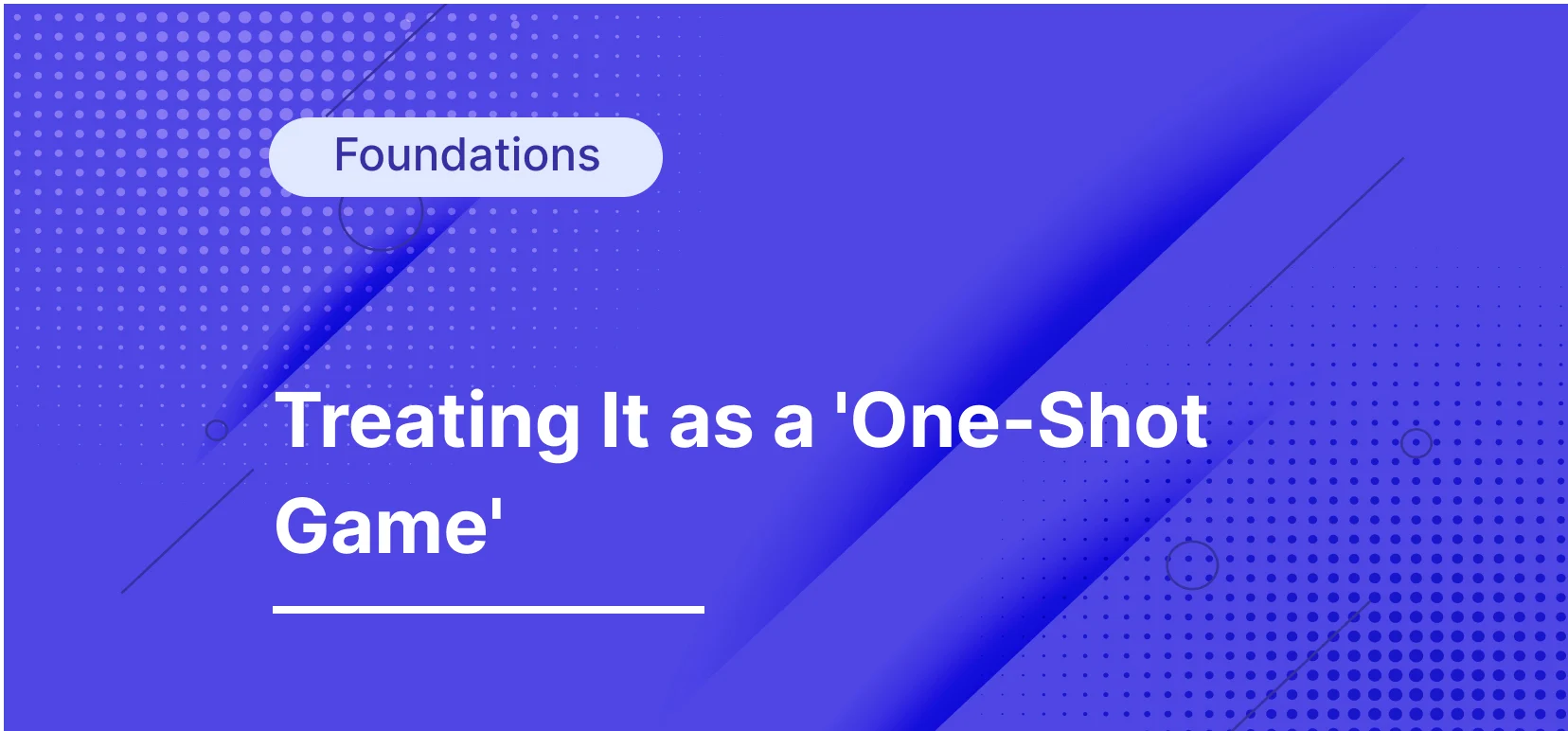- Experimentation,
- Personalization
Companies Are Failing in Personalization and Experimentation Because of Treating Them as a One-Shot Game

Personalization and experimentation are two critical components of a successful business strategy.
By tailoring products and services to meet the specific needs of individual customers, companies can improve customer satisfaction, drive engagement, and increase revenue. Experimentation, on the other hand, allows companies to test ideas, measure results, and optimize performance over time.
Despite the importance of these strategies, many companies treat personalization and experimentation as a one-shot game.
They invest significant resources in developing a single campaign or initiative, hoping for immediate success, and moving on to the next project without fully evaluating the results.
This approach is problematic for several reasons.
First, it often results in a poor customer experience, as companies fail to understand and address the needs of their customers fully.
Second, it can lead to wasted resources, as companies invest time and money in initiatives that ultimately provide little value.
Finally, it can cause companies to miss out on opportunities for growth and long-term success.
In this playbook, you’ll explore
👉 why companies are treating personalization and experimentation as a one-shot game
👉 the consequences of this approach
👉 strategies for avoiding this mentality
By embracing a long-term mindset, learning from failure, and prioritizing customer feedback, companies can unlock the full potential of personalization and experimentation in driving business success.
Why Companies Are Treating Personalization and Experimentation as a One-Shot Game
Lack of Understanding of Personalization and Experimentation
One of the main reasons why companies treat personalization and experimentation as a one-shot game is a lack of understanding of these strategies.
Personalization and experimentation are not one-time initiatives that can be completed and checked off a to-do list. Instead, they are ongoing processes that require continuous refinement and optimization.
Unfortunately, many companies fail to grasp this concept and treat personalization and experimentation as a set of tactics to be implemented and then forgotten.
Without a clear understanding of the long-term benefits of these strategies, companies are unlikely to invest the necessary resources to achieve success.
Focusing on Short-Term Goals
Focusing on short-term goals is another reason why companies treat personalization and experimentation as a one-shot game.
Companies often prioritize short-term gains over long-term success, leading them to develop campaigns that prioritize immediate results over sustained growth. This approach is problematic for several reasons:
Firstly, it can lead to a lack of investment in personalization and experimentation. When companies prioritize short-term goals, they may invest in quick-fix solutions that provide some immediate benefits but fail to address the root cause of the problem. For example, a company may run a targeted ad campaign that generates a spike in website traffic but fails to improve overall engagement or customer satisfaction.
Secondly, a focus on short-term goals can lead to a lack of experimentation. Companies may be hesitant to take risks or invest in new ideas if they are not guaranteed to produce immediate results. This mindset can stifle innovation and prevent companies from developing new and better ways to serve their customers.
Finally, a focus on short-term goals can lead to missed opportunities for growth. By prioritizing immediate results over sustained growth, companies may miss out on opportunities to build long-term customer relationships, increase customer lifetime value, and establish themselves as leaders in their industry.
To avoid the one-shot game mentality, companies must shift their focus from short-term gains to long-term success.
By embracing a long-term mindset, companies can invest in initiatives that provide sustained growth and long-term benefits. They can also prioritize experimentation and take risks to develop new and better ways to serve their customers. In doing so, companies can unlock the full potential of personalization and experimentation in driving business success.
Fear of Failure
The fear of failure is a powerful motivator and one that can cause companies to treat personalization and experimentation as a one-shot game.
When companies are afraid of failure, they may be hesitant to invest the necessary resources in personalization and experimentation, preferring instead to stick with what they know works.
This mindset can be particularly problematic in industries that are constantly evolving, as companies that fail to adapt to changing market conditions are unlikely to thrive in the long term.
One of the reasons why companies may fear failure is the potential damage to their brand reputation. Companies that invest significant resources in a campaign or initiative that fails to generate the desired results may be seen as incompetent or out of touch by their customers. This can lead to a loss of trust and loyalty, which can be difficult to recover.
Another reason why companies may fear failure is the potential financial cost. Personalization and experimentation can be expensive, requiring significant investment in technology, personnel, and other resources. If a campaign or initiative fails to generate the desired results, the company may be left with a significant financial burden and few tangible benefits to show for it.
To overcome the fear of failure, companies must embrace a culture of experimentation and learning. They must be willing to take risks and invest in initiatives that may not generate immediate results but have the potential for long-term success. They must also be willing to admit when something isn't working and pivot to a new strategy. By doing so, companies can develop a more agile approach to personalization and experimentation, one that allows them to adapt quickly to changing market conditions and stay ahead of the competition.
In conclusion, the fear of failure is a common reason why companies treat personalization and experimentation as a one-shot game.
To avoid this mindset, companies must embrace a culture of experimentation and learning, one that prioritizes long-term success over short-term gains. By doing so, companies can unlock the full potential of personalization and experimentation in driving business success.
Consequences of Treating Personalization and Experimentation as a One-Shot Game
Treating personalization and experimentation as a one-shot game can lead to poor customer experience in several ways.
Personalization and experimentation are ongoing processes that require continuous refinement and optimization.
Poor Customer Experience
When companies treat these strategies as one-time initiatives, they are unlikely to invest the necessary resources to achieve sustained success. This can result in a poor customer experience as companies fail to understand and address the evolving needs of their customers over time.
For example, a company may launch a targeted email campaign that generates a high open rate and click-through rate. However, without ongoing experimentation and optimization, the company may fail to understand why the campaign was successful and how it can be improved upon in the future. This can lead to a lack of personalization and relevance in future communications with customers, ultimately resulting in a poor customer experience.
Wasted Resources
Secondly, treating personalization and experimentation as a one-shot game can lead to wasted resources. When companies invest significant time and money in a single campaign or initiative, they may be left with few tangible benefits to show for it if the campaign fails to generate the desired results. This can result in a significant waste of resources and a missed opportunity to invest in initiatives that provide sustained growth and long-term benefits.
Missed Opportunities for Growth
Finally, treating personalization and experimentation as a one-shot game can cause companies to miss out on opportunities for growth. By failing to invest in ongoing experimentation and optimization, companies may miss out on opportunities to build long-term customer relationships, increase customer lifetime value, and establish themselves as leaders in their industry. This can result in a lack of sustained growth and a failure to achieve long-term business objectives.
In conclusion, treating personalization and experimentation as a one-shot game can lead to
a poor customer experience
wasted resources
missed opportunities for growth
To avoid these consequences, companies must embrace a long-term mindset, invest in ongoing experimentation and optimization, and prioritize customer feedback and needs. By doing so, companies can unlock the full potential of personalization and experimentation in driving business success.
Strategies for Avoiding the One-Shot Game Mentality
To avoid the one-shot game mentality, companies can adopt several strategies that prioritize long-term success over short-term gains:
Shifting to a Long-Term Mindset
One of the most effective strategies for avoiding the one-shot game mentality is to shift to a long-term mindset.
Companies that prioritize long-term success over short-term gains are more likely to invest in initiatives that provide sustained growth and long-term benefits. They are also more likely to prioritize ongoing experimentation and optimization, recognizing that personalization and experimentation are not one-time initiatives but ongoing processes that require continuous refinement and optimization.
To shift to a long-term mindset, companies must first define their long-term objectives and develop a roadmap for achieving them. They must also be willing to invest in initiatives that may not provide immediate results but have the potential for long-term success. By doing so, companies can establish themselves as leaders in their industry and build a foundation for sustained growth and success.
Embracing Failure and Learning from It
Another effective strategy for avoiding the one-shot game mentality is to embrace failure and learn from it.
Companies that are willing to take risks and experiment with new ideas are more likely to achieve long-term success than those that stick with what they know works. However, experimentation and risk-taking inevitably lead to failure from time to time.
Instead of viewing failure as a setback, companies must embrace it as an opportunity to learn and grow. They must be willing to analyze their failures, identify what went wrong, and develop new strategies for success. By embracing failure and learning from it, companies can develop a more agile approach to personalization and experimentation, one that allows them to adapt quickly to changing market conditions and stay ahead of the competition.
Prioritizing Customer Feedback
Finally, companies must prioritize customer feedback to avoid the one-shot game mentality.
Personalization and experimentation are ultimately about improving the customer experience. By prioritizing customer feedback and needs, companies can develop initiatives that provide sustained growth and long-term benefits. They can also establish themselves as leaders in their industry by delivering exceptional customer experiences that set them apart from the competition.
To prioritize customer feedback, companies must establish effective feedback mechanisms and invest in tools and technologies that enable them to collect and analyze customer data. They must also be willing to act on customer feedback, prioritizing the needs of their customers over their own internal goals and objectives.
In conclusion, companies can avoid the one-shot game mentality by shifting to a long-term mindset, embracing failure and learning from it, and prioritizing customer feedback. By doing so, they can unlock the full potential of personalization and experimentation in driving business success.
The Bottom Line: Personalization and Experimentation are Ongoing Cultural Processes
Personalization and experimentation are critical components of a successful business strategy.
By tailoring products and services to meet the specific needs of individual customers and testing ideas to optimize performance over time, companies can
🚀 improve customer satisfaction
🚀 drive engagement
🚀 increase revenue
However, many companies treat personalization and experimentation as a one-shot game:
❗ investing significant resources in a single campaign or initiative
❗ hoping for immediate success
❗ moving on to the next project without fully evaluating the results
This approach can lead to a poor customer experience, wasted resources, and missed opportunities for growth.
To avoid the one-shot game mentality, companies must embrace the following:
a long-term mindset
learn from failure
prioritize customer feedback
establish personalization and experimentation as ongoing cultural processes.
By doing so, companies can unlock the full potential of personalization and experimentation in driving business success.
Get in touch to learn how Ninetailed personalization, experimentation, and insights works inside your CMS

![4 Benefits of Headless A/B Testing [with Examples from Ace & Tate]](https://images.ctfassets.net/a7v91okrwwe3/1rAE9Eod5ybWUHtc9LEMLo/607bdcaf0512ec8f2af0f9f93dbe84f8/Ace___Tate_landscape.jpg?fm=webp&q=75&w=3840)